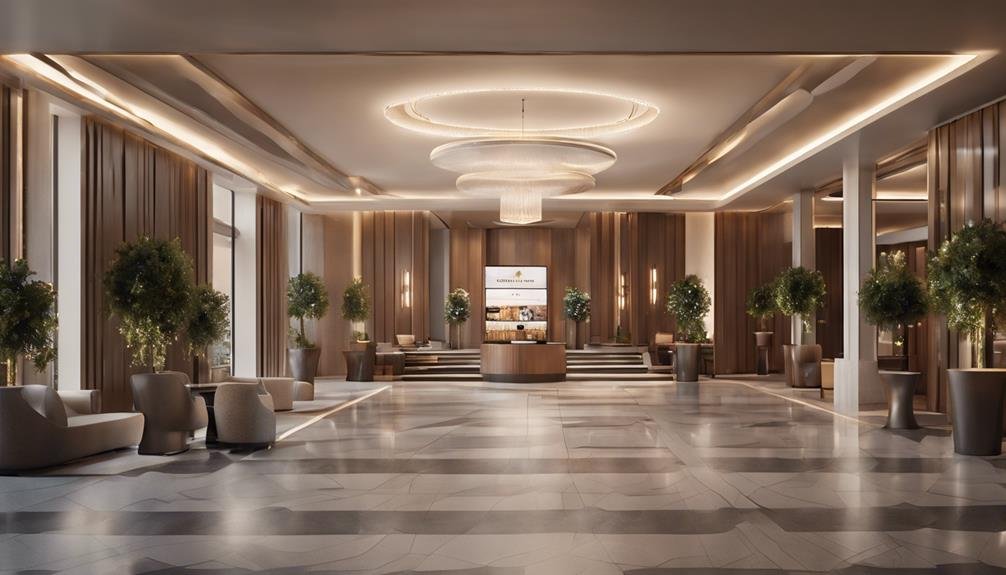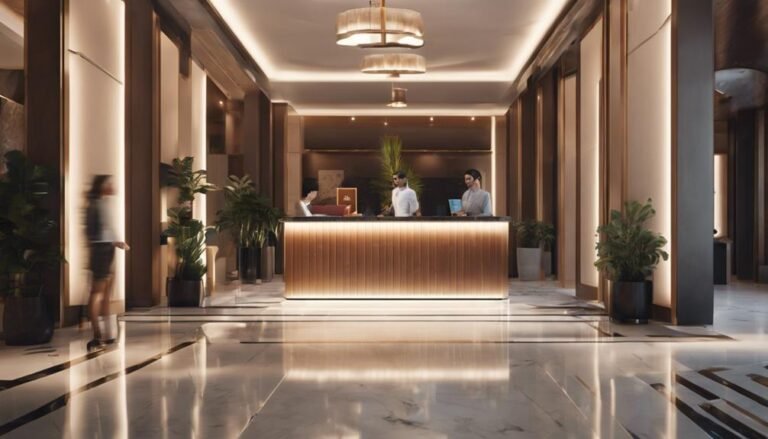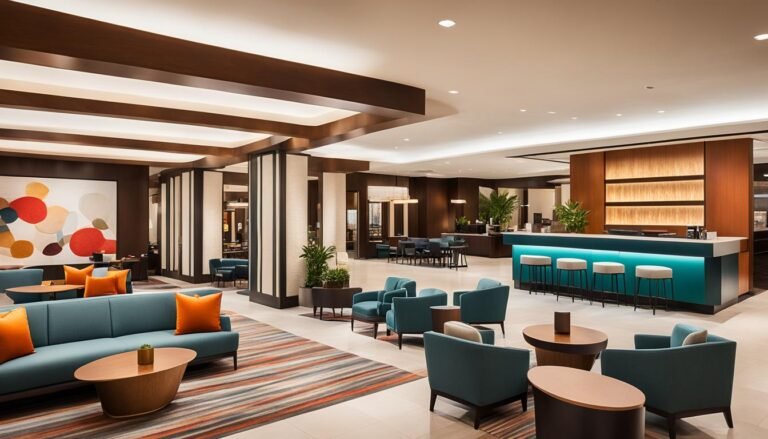The Digital Guest Experience: New Frontiers in Hospitality Technology
The digital guest experience in hospitality is evolving with groundbreaking technologies like mobile check-ins, AI-powered room customization, contactless services, virtual concierge, and data analytics. Mobile check-ins streamline guest arrival, reducing wait times at the front desk and enhancing communication. AI technology allows for personalized room preferences and real-time adjustments, while contactless services offer convenience and safety. Virtual concierge services redefine guest interaction with voice recognition and tailored recommendations. Data analytics drive personalized experiences by analyzing guest behavior for targeted promotions. These new frontiers in hospitality technology promise streamlined processes and enhanced guest satisfaction.
Key Takeaways
- Mobile check-ins streamline processes and enhance efficiency, reducing wait times and improving guest satisfaction.
- AI-powered room customization features personalize guest experiences in real-time for a tailored stay.
- Contactless services offer convenience and safety through touchless amenities, mobile check-ins, and keyless room entry.
- Virtual concierge services provide seamless guest interaction with voice recognition technology and personalized recommendations.
- Data analytics drive personalized experiences by analyzing guest preferences, behaviors, and enabling targeted promotions for increased loyalty and revenue.
Mobile Check-Ins Revolutionizing Guest Arrival
Mobile check-ins have fundamentally transformed the guest arrival experience in the hospitality industry, streamlining processes and enhancing overall efficiency. By allowing guests to check-in remotely through their mobile devices, hotels can greatly reduce wait times at the front desk, leading to a smoother and more efficient check-in process. This efficient process not only improves guest satisfaction but also frees up staff to focus on delivering a more personalized service.
Moreover, mobile check-ins facilitate enhanced communication between guests and hotel staff. Guests can receive important information such as room availability, upgrade options, and special promotions directly on their mobile devices, ensuring a seamless and personalized experience from the moment they arrive. In turn, hotel staff can efficiently communicate with guests regarding any specific requests or preferences, resulting in a more tailored and memorable stay.
AI-Powered Room Customization Features
Utilizing artificial intelligence technology, hotels are now implementing advanced room customization features to enhance the guest experience and tailor accommodations to individual preferences with unprecedented precision and efficiency. Personalized preferences are at the forefront of this technological advancement, allowing guests to specify details such as room temperature, lighting preferences, pillow types, and even the artwork displayed in their room. Through smart automation, AI can adjust these settings in real-time based on the guest's behavior and feedback, creating a truly tailored and seamless experience.
AI-powered room customization features not only cater to the guests' immediate comfort but also enable hotels to gather valuable data on individual preferences. This data can be used to anticipate future needs, personalize offers, and enhance overall guest satisfaction. By leveraging AI in room customization, hotels can streamline operations, reduce energy consumption, and differentiate themselves in a competitive market by providing a truly unique and personalized stay for each guest.
Contactless Services for Seamless Stays
The integration of contactless services in the hospitality industry is revolutionizing the guest experience. This ensures seamless stays through advanced technological solutions. Touchless amenities have become a key focus for hotels and resorts, offering guests the ability to control various aspects of their stay without physical interaction. From mobile check-ins to keyless room entry, guests can navigate their entire experience with minimal contact, enhancing convenience and safety.
Remote access is another significant aspect of contactless services that is reshaping the hospitality landscape. Guests can now use their smartphones to access room controls, order room service, or communicate with staff, eliminating the need for traditional in-person interactions. This not only streamlines operations for hotels but also provides guests with a more personalized and efficient service.
Virtual Concierge Enhancing Guest Interaction
In the evolving landscape of hospitality technology, the integration of virtual concierge services is redefining guest interaction and elevating the level of personalized service offered by hotels and resorts. Virtual concierge systems leverage advanced technologies such as voice recognition to provide guests with seamless and intuitive ways to communicate their needs and preferences. By enabling guests to interact through natural language, these systems enhance the overall guest experience by offering convenience and efficiency.
Moreover, virtual concierge services can analyze guest data and behavior to offer personalized recommendations tailored to individual preferences. This level of customization not only improves guest satisfaction but also increases the likelihood of repeat visits and positive reviews. Guests can receive suggestions for dining, activities, or services based on their previous choices or stated preferences, creating a more engaging and customized stay.
Data Analytics Driving Personalized Experiences
Enhancing guest engagement and satisfaction through tailored recommendations and improved services, data analytics plays a pivotal role in driving personalized experiences in the hospitality industry. By leveraging data analytics, hotels and resorts can gain valuable insights into guest preferences, behaviors, and trends, allowing them to offer personalized recommendations and targeted marketing strategies. Through the analysis of guest data such as booking history, amenities usage, and feedback, establishments can create customized experiences that cater to individual needs and preferences.
| Benefits of Data Analytics in Personalized Experiences |
|---|
| 1. Enhanced Guest Satisfaction |
| 2. Improved Marketing Strategies |
| 3. Increased Revenue Generation |
Hotels can use data analytics to segment guests based on demographics, behavior, or preferences, enabling them to send targeted promotions and offers that are more likely to resonate with each guest. This personalized approach not only enhances the overall guest experience but also fosters loyalty and repeat visits, ultimately driving revenue growth for the establishment.
Conclusion
To sum up, the integration of advanced technology in the hospitality industry has transformed the guest experience into a seamless and personalized journey.
Like a skilled artist wielding a brush, hotels are using mobile check-ins, AI-powered room customization, contactless services, virtual concierge, and data analytics to craft unforgettable stays for their guests.
This innovative approach not only enhances guest satisfaction but also revolutionizes the way hospitality services are delivered in the digital age.







